Your office or home probably has a lot of valuable items that mean a lot to you or that you've invested a lot of money in. But, with burglary rates at an all-time high, a regular metal safe isn't enough anymore. Thieves have gotten good at breaking into these, sometimes with just a crowbar. So, what can you do if a regular safe won't cut it? Keep reading to find out about the best safes you can use to protect your valuables at home and work.
The Best Types of Safes for Your Home and Office
Worried about a theft in your home or office? Well no longer, here are the best types of safes that can offer protection:
1) Diversion Safes
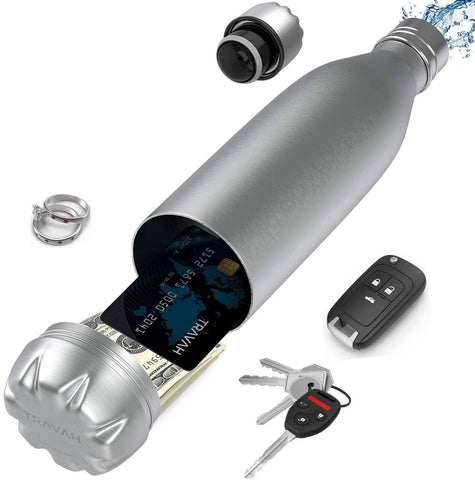
A diversion safe is a type of safe that looks like an everyday object but has a secret compartment where you can store your valuables. These safes can be designed to look like almost anything like a book, a soda can, a wall clock, an air vent, and even a perfume bottle. The idea is to hide things in plain sight. Because they look like regular items, thieves might not even think to check them if they break into your place.
Pros:
- Since they blend in with other items, it's unlikely a thief will notice them. This makes them great for hiding small, valuable items like jewelry or cash.
- Diversion safes are usually cheaper than traditional safes.
- There's no need to remember a combination or keep track of a key (unless the design specifically includes these features). You can just hide your items inside and place the safe in a sensible spot.
Cons:
- These safes are great for small items but won't hold larger valuables like laptops or large amounts of cash.
- Most diversion safes are not designed to provide protection against fire or water damage. Your valuables could be at risk in the case of a fire or flood.
- If a burglar does take the time to thoroughly search your home or office, there's a chance they could discover the safe, especially if it's not well integrated with its surroundings or if it stands out in some way.
2) Floor Safe
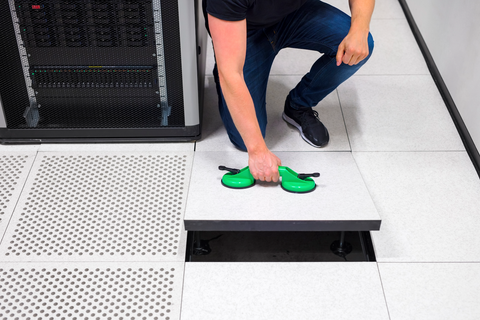
Credit: Envato Elements/ kjekol
A floor safe is a type of fire safe that's installed directly into the floor of your home or office. It's essentially a secure box made of heavy steel that sits below the surface, with the door of the safe flush against the floor level. They usually have a combination lock or a key to open it. You can hide it under a rug, furniture, or anything else that sits on the floor. They're a great choice if you're okay with a more permanent installation
Pros:
- Since they're embedded in the floor, these safes are incredibly difficult for burglars to remove or break into.
- A well-placed floor safe can be nearly impossible to find if you don't know it's there.
- Most floor safes come with water and fire ratings to protect your valuables against natural disasters.
Cons:
- Installing a floor safe is a big job and usually requires professional help, especially if you need to cut into a concrete floor.
- While being hidden is an advantage against theft, it can also make it more difficult for you to access your own belongings quickly, especially if it's under heavy furniture or constantly covered.
- While they can be waterproof from outside floods, safes in the floor might collect moisture from the ground. This could potentially harm certain valuables.
3) Fingerprint Safe
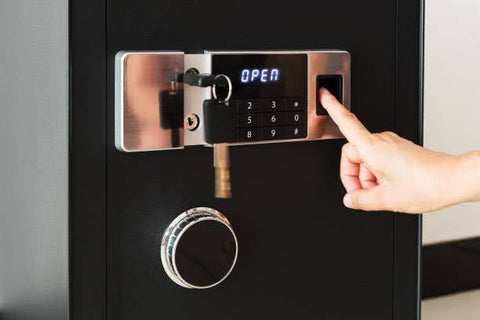
Credit: iStock
A fingerprint safe is a modern type of safe that uses your fingerprint as the key to open it. These safes can be of various sizes, from small boxes just big enough for documents and jewelry to larger ones that can store laptops or other valuable items. They use biometric technology, which is the same kind of security feature you might have on your smartphone.
Pros:
- Your fingerprint is unique, making these safes extremely secure. It’s hard for burglars to mimic or bypass your biometric data.
- They are super easy to use. You don't have to worry about forgetting a code or losing a key.
- You can control who has access to the safe by managing the fingerprints stored in its memory. This could be just you or selected family members and colleagues.
Cons:
- Fingerprint safes typically rely on batteries or an external power source to function. If the power fails and you don’t have a backup, you might not be able to access your safe.
- Like all technology, biometric scanners can face technical glitches or failures, which might lock you out temporarily.
- Generally, fingerprint safes are more expensive than traditional safes because of the advanced technology involved.
4) Data Safe
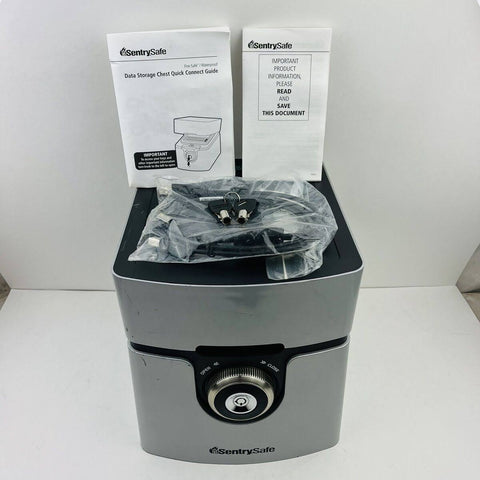
Credit: Sentry Safe
A data safe is specially designed to protect electronic data storage devices, such as hard drives, USB drives, CDs, DVDs, and even smartphones. Unlike regular safes, they also protect electronic media from fire, humidity, and magnetic fields, which can all destroy digital information. They're made with insulation materials that can withstand high temperatures and humidity levels without letting the inside get damaged and include a locking mechanism like a biometric lock or a key lock.
Pros:
- Data safes come with advanced water and fire protection, which is crucial for preserving valuable digital information.
- Storing digital media in a data safe helps prevent data theft, which can be as valuable, if not more valuable, than physical items.
- These safes maintain a stable internal environment to protect sensitive electronic devices from humidity, dust, and magnetic fields.
Cons:
- Data safes can be more expensive than traditional safes due to the specialized technology and materials used.
- They tend to be heavier and bulkier due to the materials needed to provide their high level of protection. This might make installation more challenging.
- While excellent for digital media, they might not be necessary for all types of valuables, especially non-digital items that don't require protection from magnetic fields or specific humidity levels.
5) Wall Safes

Credit: iStock
A wall safe is a security safe that is installed directly into a wall. The front of the safe is flush with the wall surface, making it easy to conceal behind furniture, paintings, or a built-in panel. They're great for storing valuables like jewelry, documents, and small heirlooms while taking up minimal space in your home or office. They come in various sizes and can be equipped with different locking mechanisms, including keypads, keys, or biometric scanners.
Pros:
- Since they're installed into the wall, they don't take up floor space, making them ideal for smaller rooms or areas.
- It's easy to hide a wall safe behind objects or wall hangings. This makes them less noticeable to potential thieves.
- Wall safes are usually installed at eye level, making it easier to access your valuables without needing to bend down or reach up high.
Cons:
- Installing a wall safe can be difficult. It often requires cutting into the wall and may need professional help to ensure it's securely mounted.
- Wall safes are typically smaller due to the space available within a wall. This limits the amount of valuables you can store.
- Not all walls are suitable for installing a safe, especially if they're not thick enough or if the safe's weight exceeds what the wall can support. You also need to consider the location of electrical wiring and plumbing.
6) Jewelry Safe
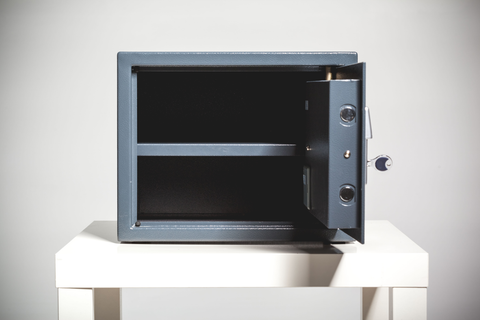
Credit: Envato Elements/ FabrikaPhoto
While not usually suitable for your office, a jewelry safe is designed specifically to store and protect your jewelry in your home. These safes often come with specialized features such as velvet-lined drawers, compartments of various sizes, and sometimes even necklace hangers to keep everything organized and prevent damage. They can vary in size, security features, and locking mechanisms,. They're built to be more secure and resistant to theft, fire, and sometimes water.
Pros:
- The interior is designed to hold jewelry. This can help prevent tangles, scratches, and damage.
- Jewelry safes are often made with better materials and locking mechanisms since they're meant to protect high-value items.
- Many come with options to customize the interior layout to fit your collection perfectly.
Cons:
- Jewelry safes can be more expensive than standard safes due to their specialized design and security features.
- Larger models require sufficient space for installation. This might not be ideal for smaller homes or offices.
- Even though they can be used to store other valuables, their size restricts them from doing so.
7) Gun Safes
Credit: Envato Elements/ Tatiana_Mara
A gun safe is a secure container that can prevent unauthorized access to your guns. They're made from heavy-duty materials and can be locked with various mechanisms, including keypads, combination locks, or biometric systems like fingerprint readers. They come in different sizes, from small cases that hold a single handgun to large cabinets that can store multiple rifles or shotguns, along with ammunition and accessories.
Pros:
- Gun safes are built tough to resist break-ins.
- Keeping guns locked up reduces the risk of accidental discharge or harm. This is especially important if you have children in your home.
- Most gun safes are fire-resistant safes that come with a high water and fire rating to prevent any rusting issues.
Cons:
- High-quality gun safes, especially those with advanced security features, can be expensive.
- In an emergency, unlocking a safe to access your firearm could take extra time.
- Larger gun safes need a dedicated space in your home or office. You'll need to plan where to place it, considering both accessibility and concealment.
What to Consider When Choosing a Safe for Your Home or Office
Here are some factors to consider when choosing a safe:
- Think about what you need to store in the safe. Is it documents, jewelry, guns, or digital media? Make sure the safe is big enough for your items but also fits well in the space you have.
- Safes come with different locking mechanisms, like key locks, combinations, or biometric scanners. Decide what level of security and convenience you need. For example, if you don't like remembering numbers, a biometric safe might be best.
- If you're storing important documents or digital devices, look for a safe that offers water and fire resistance. This way, your valuables will be safe during natural disasters.
- Consider how often you'll need to access the safe. If you need quick access, look for one that opens easily and quickly.
Summary
Choosing the right safe for your home or office is crucial in keeping your valuables secure. Whether it's documents, jewelry, guns, or digital media, there's a safe out there that fits your needs. Remember to consider the size, lock mechanism, security level, fire and water protection, and how often you'll access it.
Looking for a smart way to protect your small valuables? Check out Travah's diversion safes. Designed to blend seamlessly into your home or office, our safes offer the ultimate protection for your belongings. Shop with us today.


